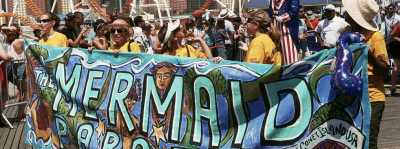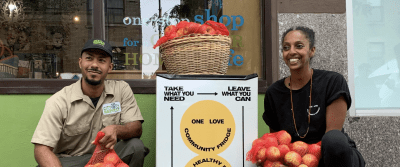Courtesy instagram.com/marianellasoap
An Instagram-ready beauty and self-care shop in Cobble Hill
Jabonería Marianella’s handmade Venezuelan-inspired soaps have found cozy new homes in Cobble Hill and Greenpoint
“You have your mask on, but it smells really good in here,” says Jillian Fracassi, the head of retail at Marianella. She hands me a bar of wisteria and jasmine soap. A baby pink M is stamped on the wrapping—the same M that hangs in a glowing neon sign above the market’s in-store porcelain bathtub.
The Marianella Market certainly looks like it smells good. Their signature goat milk soaps are arranged in neat pyramids on every table, the shelves glimmer with facial serums and toners, and a dozen plants sprout throughout the shop. The market is the sustainable beauty brand’s newest “experiential” retail location; they invite customers to test out products in their fully-functional in-store bathroom display and snap pics in their “selfie” mirror.
Jabonería Marianella was founded in 2007 by New York fine artist David Foote and his mother, graphic designer Marianella Febres-Cordero. Both from Venezuela, the duo’s all-natural fragrances are born out of Marianella’s nostalgia for her travels and her childhood spent making soaps and beauty products by hand in her grandmother’s kitchen.
The company has since expanded into a bath and body line sold at over 200 luxury boutiques worldwide, but Marianella, now in her 70s, still personally crafts all of their soaps from her home in Texas.
“She is definitely hands on as a creator,” Fracassi tells me. “David and I will have ideas and come up with products, but she researches the ingredients and designs all the formulas.”
At the beginning of the pandemic, Marianella was one of the few independent beauty brands offering handmade hand sanitizers. The company was still operating out of their soap bar and spa flagship in SoHo (Fracassi’s husband is Karim Raoul, the owner of Raoul’s French restaurant in the neighborhood), and they spent months shipping out lavender scented hand gels and sanitizing surface sprays. When their rent shot back up to pre-pandemic price, the brand decided to shut down their SoHo store and move their soap-making operations to Greenpoint.
“We got very lucky, but we struggled a bit through the winter. We were really hoping to get a Covid relief loan, which we finally got in July,” Fracassi says. “We knew we needed to do something with the loan that was going to make an impact, and brick and mortar was the best way to do it.”
In late August, Marianella transformed their Greenpoint factory location into a public market and opened a second market in Cobble Hill. Currently, all of their products are cooked up in small batches in their Cobble Hill kitchen and basement–a large space hidden beneath the twinkling storefront.
View this post on Instagram
Both of the Marianella Markets, along with stocking fresh Marianella concoctions, host products from a selection of independent beauty and home brands. Fracassi, who grew up in the Bronx, has made a point of spotlighting regional artisans and woman-owned businesses in their inventory.
“We are definitely local. I like to carry New York companies,” she says. Among the various locally-sourced products, the shop sells herbal supplements from Anima Mundi, an apothecary that originated in Greenpoint, and hand dyed napkins from Ichcha, a New York based textile studio.
Like all of Marianella’s commercial designs, The Marianella Markets are meticulously curated and Instagram-prepped (“we have a discount if you get in the tub, take a picture, and tag us”). The twin locations have identical interiors and matching bathroom designed by Foote and Space NY, a creative consultancy that specializes in luxury boutiques and pop-ups.
“We made a whole blueprint of the store,” Fracassi says. “If someone wanted to open a Marianella Market in Austin, Texas, they could.”
For now, the company is settling into the borough.
“Cobble Hill is a special neighborhood. It’s really family oriented–even Greenpoint is family oriented. People want you to succeed here,” says Fracassi. “When we were opening, people were sticking their heads in every day asking what we were up to. People were genuinely curious and happy that something new was coming.”
You might also like 


























